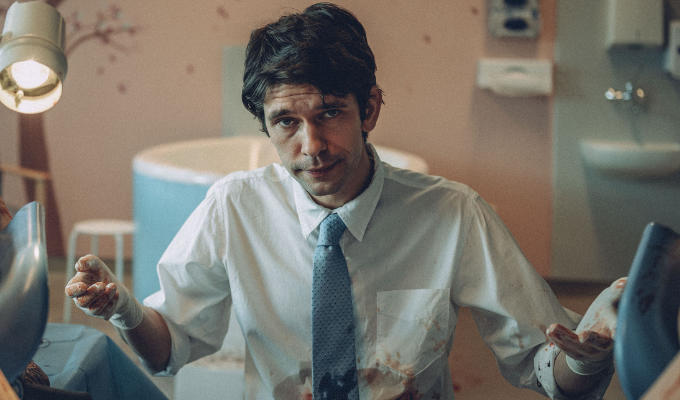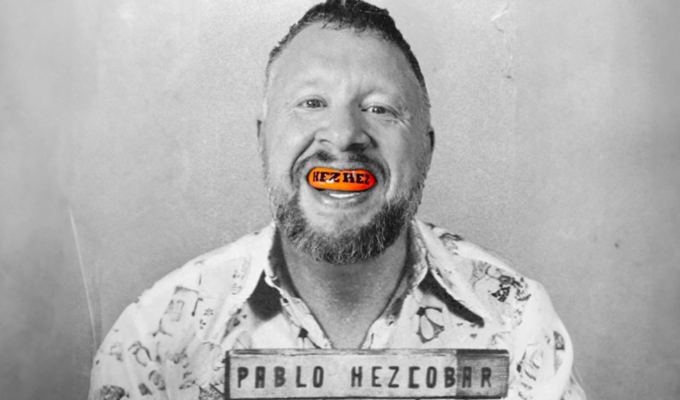 © BBC
© BBC 'This feels like an important show'
Ben Whishaw on the BBC adaptation of This Is Going To Hurt
Ben Whishaw plays Adam Kay in the new adaptation of his NHS memoirs, This Is Going To Hurt, which comes to BBC One tomorrow. Here, the actor talks about getting squeamish, the show’s social and political relevance – and what he thinks about the real Adam Kay.
Tell us the premise of This Is Going To Hurt…
Adam Kay is a junior doctor when we meet him, trying to keep afloat in a system that is unrelenting. He’s someone who’s really trying to do good but also deal with his own flaws, foibles, shortcomings and failings, which is really interesting because I think when you go into a hospital or when you are dealing with a doctor, you think they are superhuman in some way. I love that this character is all too human really.
Were you aware of the book before taking on the role?
I must be the only person in the country who hadn’t heard of it before I got sent it and before I met Adam, which is a bit embarrassing! But I certainly know it now.
How does the fictional Adam differ from the real Adam Kay?
Well, that’s a good question. I’m not really sure! I find the way he writes himself extremely interesting because it’s so naked, in a sense. He doesn’t really try to make himself look better than he is. In fact, he seems to go to pains to really show all his flaws and failings.
What drives your character Adam, and why does he keep working for the NHS?
It’s a complicated question. I think partly he comes from a long line of doctors and I think it was what was expected of him as a young person.
There’s so much that goes into training to become a doctor and it takes up so much of your life. So you get to a certain stage and you have done nothing else other than medicine, it’s the only thing you can do, it’s become your entire existence. I think there’s a really genuine wish to do something useful, to be of service to people. I think that is really a sincere part of his drive.
The sets have a particular look, different from other hospital dramas. Could you tell us about that?
I think they’ve done the most incredible job of making it feel like you’re in a real hospital. It’s so detailed. You almost feel like you can smell it.
I don’t know about you, but whenever I go into a hospital, it makes me feel a certain strange array of sensations. Partly dread, I don’t know. And I get the same feeling when I walk on here. I don’t quite know how they’ve done it. It’s a sort of magic trick.
Have you been given any basic medical training?
Yes, but really very basic. It’s been so interesting. We’ve learned how to do Caesareans. I had no idea that it was as basic a process as it is. You literally take a scalpel and slice through the flesh and then you literally put your hands in and pull the muscles apart and then you shove your fist in and grab the baby. Things like that are extraordinary.
Have you been squeamish at all with all the blood and gore?
I’ve been OK. Usually, I can detach because I know it’s not real - but having said that there was a supporting artist who was just being wheeled through the back of a shot but he had a broken leg. And it was an incredible piece of prosthetics because you saw the bone jutting out of his shin and it really, really gave me a very visceral reaction.
Any other operations or procedures that stand out for you?
Some of the funniest ones have been when, in the gynaecology ward, having to remove various items from various orifices. They’ve been very funny and memorable.
There was also a scene that I particularly love when a woman wants to eat her own placenta because she’s read that it’s a good thing for her and the baby, and, well, it gets messy.
What do you think the show portrays about what it’s like to work for the NHS?
Adam Kay is really interested in showing the toll it takes on people’s mental health, emotional life, and personal life when you’re a doctor. I had no idea, really, of the pressures that these people are under. So while it is hopefully very funny at times. It has a really serious agenda, politically and socially.
And what are the challenges that young doctors face when they attempt to have any sort of normal or healthy relationship?
A lot of it is to do with how you navigate having to essentially detach from your emotions, because as a medic obviously you can’t be profoundly emotionally affected by every situation you deal with. At the same time, you can’t be entirely devoid of feeling.
So navigating this is profoundly difficult and there’s no, or very little or negligible, support in that way for doctors.
It’s all those sorts of questions: how do you share what’s happened in your day with your partner? Is it right to load it on someone else?.
Can you tell us about the relationship between Adam and his boyfriend Harry, played Rory Fleck Byrne?
I hope something we’ve managed to convey is that they do love each other. They’re good for each other. It seems to be working in some way between them. Certainly, Harry seems to lighten up Adam, soften him a little bit, but it’s hard and the job takes its toll on the relationship.
And what about Adam’s relationship with his parents? What’s that like?
In the show, I guess, he feels like he’s never good enough for his mother [Veronique, played by Dame Harriet Walter]. Nothing he has ever done or will ever do will satisfy her, and will never get the response from her that he longs to get. I think it’s how a lot of people feel about their relationship with their parents. So, I think it’s a really amazingly drawn element in the script.
And what about the relationship with Shruti, a young junior doctor.

I think in some ways it’s the centre of the show. Adam is Shruti’s boss, sort of. And he really lets her know that at times. It’s very tenderly drawn, though.
It’s mainly wonderful to me because I absolutely adore the actress that plays Shruti. Her name is Ambika Mod and she’s amazing. I’m just blown away by her!
This show feels particularly timely - would you agree?
Yeah, I think it’s a time when we’ve all been more aware than normal, probably, of just how much we owe to the people who work for the NHS. The extraordinary work they do and what they sacrifice to do it.
I think we’re all still reeling from the last couple of years. But certainly, I feel like in making the show, there’s a real sense of purpose amongst the cast and crew and everyone. This feels like something important to do.
• This Is Going To Hurt starts on BBC One on Tuesday February 8 at 9pm.
Published: 7 Feb 2022






